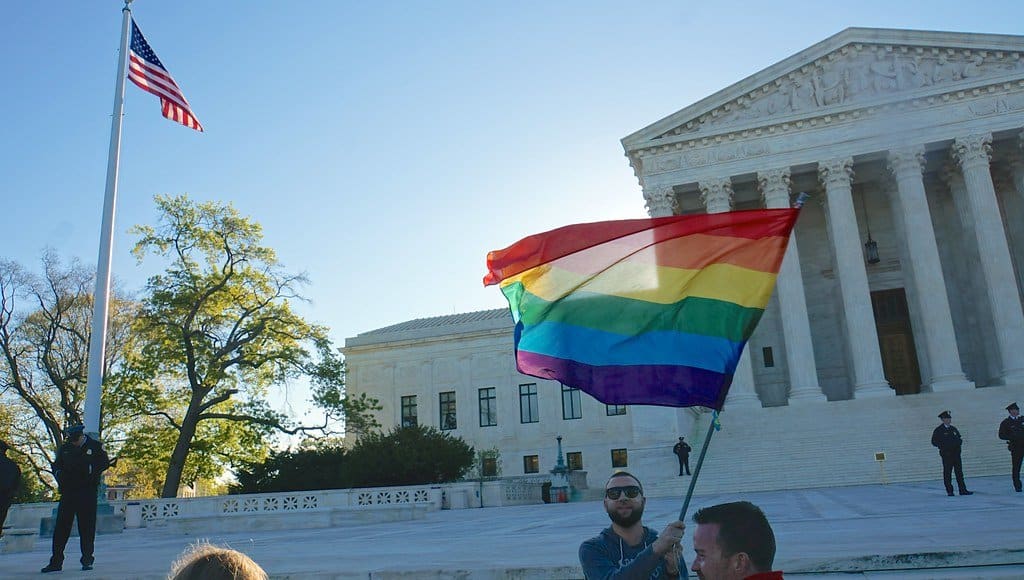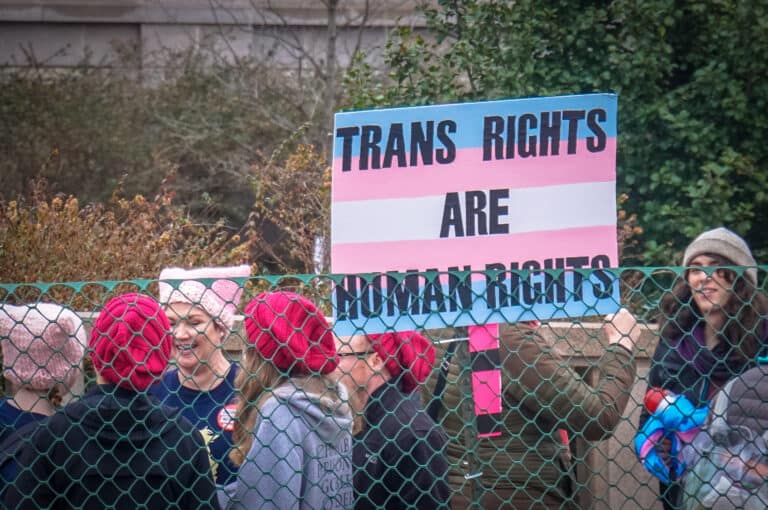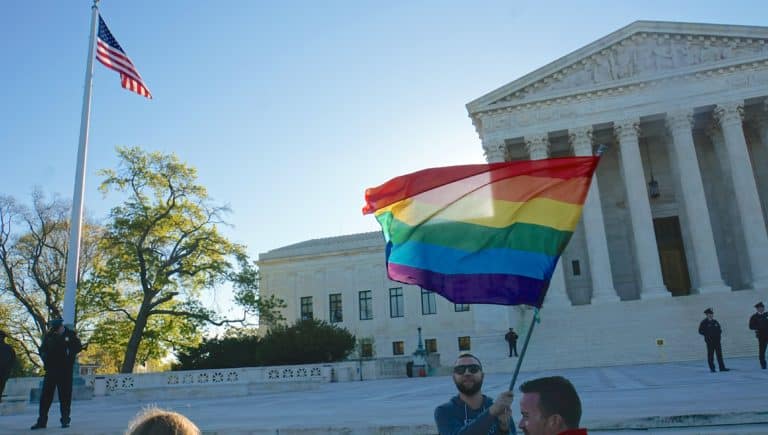Today we continue our review of the amicus briefs submitted in support of the employers in Bostock, Zarda, and Harris.
Businesses and Executives
The H.T. Hackney Co., an American wholesale distributor facing a sexual orientation discrimination lawsuit of its own, asserts that Title VII only concerns differential treatment between men and women and that sex stereotyping cannot form a claim under Title VII on its own. It also argues that any change in Title VII’s scope must come from Congress rather than the courts.
A group of Christian business organizations contend that an expansive reading of Title VII would create issues for businesses that the Court is not in the best position to address. In addition to concerns about safety and privacy, medical insurance coverage, and language use, employers seeking to avoid liability for disparate impact claims under Title VII would be forced to make assumptions about employees’ gender identity and sexual orientation to demonstrate compliance.
The Christian Employers Alliance explains that many Americans’ religious beliefs require them to run their businesses in line with their faith. Sex-specific dress codes and grooming policies that flow from those religious beliefs comply with Title VII if they do not impose unequal burdens on men and women. Courts are not qualified to determine which religious practices are valid.
A group of women business owners and CEOs say that expanding Title VII’s bar against sex discrimination to encompass gender identity discrimination would frustrate the statute’s purpose of providing equal opportunities for women by forcing women to compete with “biological men” for the opportunities available to women. Keeping Title VII limited would preserve women’s access to the protections of Price Waterhouse because sex stereotyping could still be used as evidence of sex discrimination.
Politicians, Lawmakers, and Government
The United States contends in Zarda/Bostock that sex does not mean sexual orientation and that discrimination because of sex must involve treatment of one sex less favorably in order to be actionable under Title VII. It also rejects the employees’ three theories (but-for, associational, and sex stereotyping) for why discrimination because of sex des not extend to sexual orientation, mimicking the arguments made in the briefs from Clayton County and Altitude Express.
A group of 15 U.S. states say that the Court should leave policy decisions like these to Congress. When the judiciary takes on the role of the legislature, it skirts constitutional restrictions designed to protect the interests of the states while also stymieing legislative efforts at the state level.
A group of U.S. Senators and Members of Congress argue that Title VII can only be amended through the constitutionally-prescribed process of bicameralism and presentment. Moreover, adherence to stare decisis is particularly crucial in questions of statutory interpretation, because lawmakers and citizens can seek amendment through the legislature. If Congress desired to add sexual orientation and gender identity to list of Title VII’s protected categories, it could have done so.
Scholars and Academics
Ryan T. Anderson, a researcher, explains that LGBTQ people are not excluded from the reach of Title VII, but they can only bring claims under the categories that Congress actually chose to protect. Title VII’s bar against sex discrimination specifically prohibits double standards based on sex. Where an employer takes adverse action against LGBTQ people whether they are men or women, there is no sex discrimination.
W. Burlette Carter, a professor emerita at Georgetown Washington University Law School, says that the EEOC is not entitled to deference on the question of whether Title VII’s bar against sex discrimination covers gender identity discrimination. Carter says that the EEOC’s process was hidden from public view and did not consider the rights of women and girls and religious persons. Because Congress did not intend to cover gender identity discrimination, such claims must be considered “derivative,” making Oncale the proper framework. Oncale requires that courts assess whether the derivative claim constitutes an evil “reasonably comparable” to that with which Congress was concerned and whether recognition of the claim would conflict with the rights of core Title VII stakeholders. Under this standard, the EEOC was incorrect to say that every instance of gender identity discrimination would constitute sex discrimination. Carter reaches a similar conclusion with respect to sexual orientation discrimination.
A group of scholars of family and sexuality say that incoherent conceptions of gender identity demonstrate that it is not the same as sex. The absence of a “definitional consensus” has also made the transgender population difficult to accurately study. The incidence of discrimination against transgender people is thus unknown.
A group of self-described national medical and policy groups that study sex and gender identity claim that biological sex is proper for classification because it is innate and medically determinable, whereas gender identity is not a good basis for classification because of its subjectivity. Redefining what constitutes sex is not the role of the judiciary, and it could have adverse medical consequences, such as stifling therapy treatments for gender dysphoria.
A group of scholars of philosophy, theology, law, politics, history, literature, and the sciences contend that holding that discrimination because of sex encompasses discrimination because of gender identity requires accepting that gender identity is a real category. Assenting to the concept of gender identity would mean believing that human persons are “conceived in a fragmented or reductive, rather than a holistic, natural, or organic way.” The Court should not codify a belief system with such vast implications.
The American Public Philosophy Institute argues that the original meaning of sex discrimination under Title VII barred employers from making, not merely recognizing, distinctions between sexes. Where a sex distinction derives from a source prior to employment markets, such as biology or custom, employers cannot be held liable for taking it into account.
Paul McHugh, a psychiatry professor at Johns Hopkins University School of Medicine, says that sex is distinct from gender identity and that growing efforts to treat people with gender dysphoria using social affirmation, hormone treatment, and sex reassignment surgery is rooted in ideology, not evidence-based medicine.










Daily News & Commentary
Start your day with our roundup of the latest labor developments. See all
February 27
The Ninth Circuit allows Trump to dismantle certain government unions based on national security concerns; and the DOL set to focus enforcement on firms with “outsized market power.”
February 26
Workplace AI regulations proposed in Michigan; en banc D.C. Circuit hears oral argument in CFPB case; white police officers sue Philadelphia over DEI policy.
February 25
OSHA workplace inspections significantly drop in 2025; the Court denies a petition for certiorari to review a Minnesota law banning mandatory anti-union meetings at work; and the Court declines two petitions to determine whether Air Force service members should receive backpay as a result of religious challenges to the now-revoked COVID-19 vaccine mandate.
February 24
In today’s news and commentary, the NLRB uses the Obama-era Browning-Ferris standard, a fired National Park ranger sues the Department of Interior and the National Park Service, the NLRB closes out Amazon’s labor dispute on Staten Island, and OIRA signals changes to the Biden-era independent contractor rule. The NLRB ruled that Browning-Ferris Industries jointly employed […]
February 23
In today’s news and commentary, the Trump administration proposes a rule limiting employment authorization for asylum seekers and Matt Bruenig introduces a new LLM tool analyzing employer rules under Stericycle. Law360 reports that the Trump administration proposed a rule on Friday that would change the employment authorization process for asylum seekers. Under the proposed rule, […]
February 22
A petition for certiorari in Bivens v. Zep, New York nurses end their historic six-week-strike, and Professor Block argues for just cause protections in New York City.